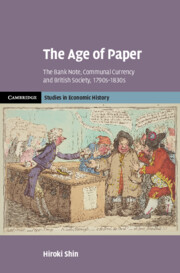Book contents
- The Age of Paper
- Reviews
- Cambridge Studies in Economic History
- The Age of Paper
- Copyright page
- Contents
- Figures and Illustrations
- Tables
- Acknowledgements
- Abbreviations
- Introduction
- 1 The Beginning of the Bank Restriction Period
- 2 The Users of the Bank of England Note
- 3 The Registers of Paper-Currency Use
- 4 Gold, Gold, Gold
- 5 The Forgery Crisis and the Radicalisation of Communal Currency
- 6 Resumption and Its Aftermath
- Conclusion
- Bibliography
- Index
Introduction
Published online by Cambridge University Press: 19 December 2024
- The Age of Paper
- Reviews
- Cambridge Studies in Economic History
- The Age of Paper
- Copyright page
- Contents
- Figures and Illustrations
- Tables
- Acknowledgements
- Abbreviations
- Introduction
- 1 The Beginning of the Bank Restriction Period
- 2 The Users of the Bank of England Note
- 3 The Registers of Paper-Currency Use
- 4 Gold, Gold, Gold
- 5 The Forgery Crisis and the Radicalisation of Communal Currency
- 6 Resumption and Its Aftermath
- Conclusion
- Bibliography
- Index
Summary
The Introduction provides the general context for what this book calls the communal currency tradition in British society. Its chronology starts in the early 1790s when the French revolutionary government’s experiment with the state-issued fiat paper currency, the assignat, caused heated discussion in Britain, which eventually consolidated Britain’s currency exceptionalism. The recent revival of the state theory of money (neo-chartalism) provides a reference point for the book’s unique theoretical outlook, which is explained by drawing upon the existing literature on economics, sociology and historical studies. After an overview of the development of monetary ideas, the communal currency tradition, which was closely associated with the idea of voluntary acceptance, is further explained based upon the writings of Edmund Burke and his involvement in the legal ban on the circulation of assignats in England. The broad outline of the book’s discussion is delineated by presenting the scope of communal currency as it impacted the economic, political, cultural and social aspects of British society.
- Type
- Chapter
- Information
- The Age of PaperThe Bank Note, Communal Currency and British Society, 1790s–1830s, pp. 1 - 27Publisher: Cambridge University PressPrint publication year: 2025

